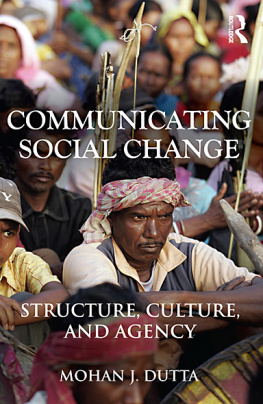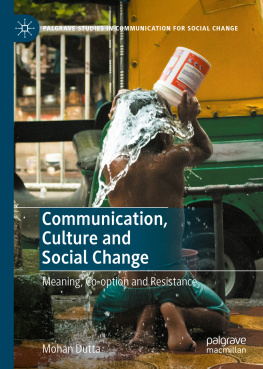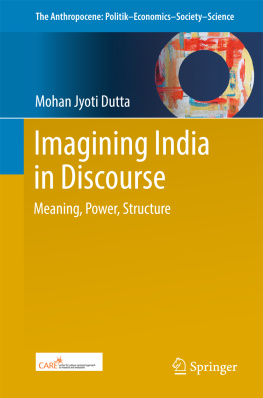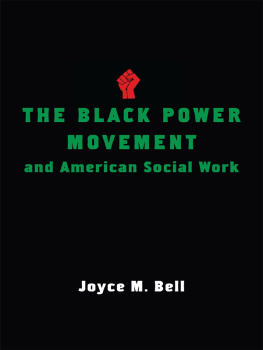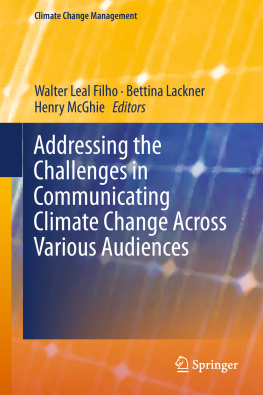COMMUNICATING SOCIAL CHANGE
Communicating Social Change: Structure, Culture, and Agency explores the use of communication to transform global, national, and local structures of power that create and sustain oppressive conditions. Author Mohan J. Dutta describes the social challenges that exist in current globalization politics, and examines the communicative processes, strategies, and tactics through which social change interventions are constituted in response to the challenges. Using empirical evidence and case studies, he documents the ways through which those in power create conditions at the margins, and he provides a theoretical base for discussing the ways in which these positions of power are resisted through communication processes, strategies, and tactics. The interplay of power and control with resistance is woven through each of the chapters in the book.
This exceptional volume highlights the points of intersection between the theory and praxis of social change communication, creating theoretical entry points for the praxis of social change. It is intended for communication scholars and students studying activism, social movements, and communication for social change, and it will also resonate in such disciplines as development, sociology, and social work, and with those who are studying social transformations.
Mohan J. Dutta is Professor of Communication and Associate Dean for Research and Graduate Education in Liberal Arts at Purdue University, where he teaches and conducts research in international health communication, critical cultural theory, poverty in healthcare, politics of resistance, and public policy and social change. In recognition of his scholarly productivity, Professor Dutta has been recognized as the Lewis Donohew Outstanding Scholar in Health Communication, and as the Lim Chong Yah Professor of Communication and New Media at the National University of Singapore. Currently, he serves as senior editor of the journal Health Communication.
COMMUNICATION SERIES
Jennings Bryant / Dolf Zillmann, General Editors
Selected titles include:
Singhal/Rogers: Entertainment-Education: A Communication Strategy for Social Change
Singhal/Cody/Rogers/Sabido: Entertainment-Education and Social Change: History, Research, and Practice
Swartz: Social Justice and Communication Scholarship
COMMUNICATING SOCIAL CHANGE
Structure, Culture, and Agency
Mohan J. Dutta

NEW YORK AND LONDON
First published 2011
by Routledge
270 Madison Avenue, New York, NY 10016
Simultaneously published in the UK
by Routledge
2 Park Square, Milton Park, Abingdon, Oxon OX14 4RN
Routledge is an imprint of the Taylor & Francis Group, an informa business
This edition published in the Taylor & Francis e-Library, 2011.
To purchase your own copy of this or any of Taylor & Francis or Routledges collection of thousands of eBooks please go to www.eBookstore.tandf.co.uk.
2011 Taylor & Francis
The right of Mohan J. Dutta to be identified as author of this work has been asserted by him in accordance with sections 77 and 78 of the Copyright, Designs and Patents Act 1988.
All rights reserved. No part of this book may be reprinted or reproduced or utilized in any form or by any electronic, mechanical, or other means, now known or hereafter invented, including photocopying and recording, or in any information storage or retrieval system, without permission in writing from the publishers.
Trademark Notice: Product or corporate names may be trademarks or registered trademarks, and are used only for identification and explanation without intent to infringe.
Library of Congress Cataloging-in-Publication Data
Dutta, Mohan J.
Communicating social change: structure, culture, and agency / Mohan J.
Dutta.
p. cm.
1. Social change. 2. CommunicationSocial aspects. I. Title.
HM831.D88 2011
302.2dc22
2010036231
ISBN 0-203-83434-8 Master e-book ISBN
ISBN: 9780415878739 (hbk)
ISBN: 9780415878746 (pbk)
ISBN: 9780203834343 (ebk)
To Debalina for dreaming a better world together
To Ma for the lessons in dreaming
To Nana for nurturing the seeds of every dream
And for Shloke
So that you may dream!
CONTENTS
PREFACE
Communicating Social Change: Structure, Culture, and Agency describes not only the social challenges constituted in the realm of current globalization politics, but also the communicative processes, strategies, and tactics through which social change interventions are constituted in response to these social challenges. In doing so, the goal of the book is to theorize about the communicative possibilities for transforming global, national, and local structures of power that create and sustain oppressive conditions in various sectors of the globe. Communication is theorized in terms of its transformative capacities in bringing about changes in oppressive political, economic, and social configurations. Based on empirical evidence, each part documents the various ways through which positions of power create conditions at the margins, offering a theoretical base for discussing the ways in which these positions of power are resisted through communication processes, strategies, and tactics in global spaces and in local sites of articulation. The interplay of power and control with resistance is weaved in through each of the chapters in the book.
Communication is situated at the intersections of structure, culture, and agency; these intersections are articulated through examples and case studies presented in each chapter. With the goal of discussing key social challenges and the communication processes, strategies, and tactics mobilized to deal with these challenges, the book is divided into two parts. are wrapped up by discussions about the pragmatic implications of social change theories in communication. Ultimately, the book points the reader toward various ways in which communication comes to bring about transformations in unequal global structures.
ACKNOWLEDGEMENTS
This book embodies the values that my joint family, Dutta Bari, taught me. I was born in a house of communist teachers, who believed in the value of change, gave their lives to it, and continue to dedicate their passion and energy to the politics of change so that the world may be a better place for those in the margins of society. As I pen this book, joint families in the Indian context are continuing to disappear in the face of the politics of modernization, fragmentation, and development. It is in the face of this onslaught of the images and material interventions of development and modernity that I cherish and will always cherish the life that I grew up amidst, surrounded by the loving care of my mothers and aunts, the politically engaged guidance of my uncles, and the friendships of my brothers and sisters.
It is almost a decade now since my grandmother Nana passed away, but her values of compassion, courage, and political involvement inspire me. Godaikaka and Boro pishi, your teachings and lessons through a life lived in sacrifice continue to model many of the values that found their way into the pages of this book. Pishimoni, your tireless work with Rittwick inspired me to take up the politics and performance of social change. Thank you Baba for the lessons in Marxist theory. You guided me through the works of Marx, Lenin, Engels, Trotsky, and later in life, Howard Zinn and Noam Chomsky. Ma, your love is a pillar of strength and your unshakeable faith an inspiration to always do better than the last time. We are lucky to have your presence in our lives; your endless support, love, and faith saw through the wrapping up of the book. Munna, Tuku, Tattu, Babai, thanks for the arguments, for the many moments of play, and for being my younger siblings. Bordi, Chordi, and Didibhai, thanks for your love. Ria, Rua, and Gulli, each of you are wonderful sources of joy and promises of the future. Thanks also to my maternal uncles and aunts, the Biswas family, for their unfettered love, kindness, and generosity of spirit.

